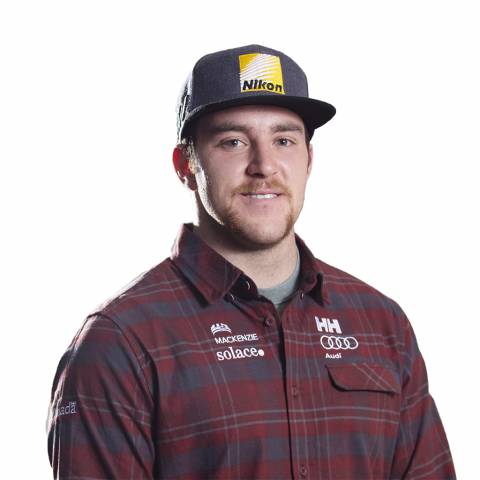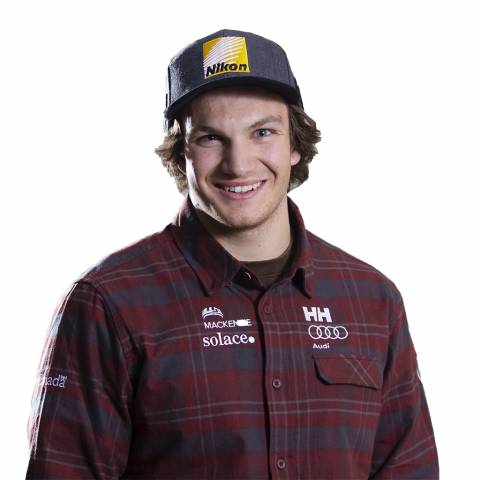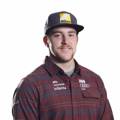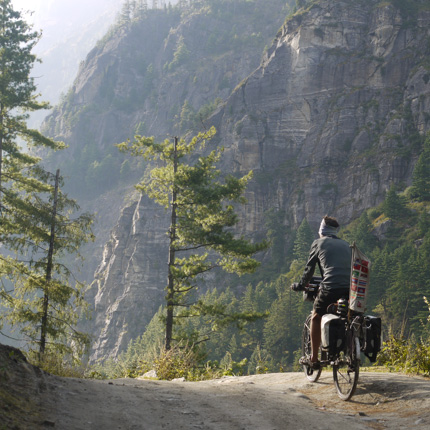Adventure Uncovered: Is there anything else you train as a guide, Tristan, that may not be so obvious?
Tristan: One thing I’d never thought of before starting this role is the effect of the snow coming off of your skis. When we try to slow ourselves down we pivot the skis really fast, and it kicks up a puff of snow. I need strategies for slowing myself down without interfering with Mac’s vision. As you make that cloud, it's basically skiing through fog or really heavy snow. And it's cold!
Adventure Uncovered: How do you do that?
Tristan: When you're racing you try and take the fastest line possible through the gate, meaning you're really close to it. We're talking centimetres. What I'll do is make my line a little wider. It'll take me more time to execute the turn. Then Mac usually skis a little bit inside of my line, so I put him in a good place to ride.
Adventure Uncovered: In terms of regulating your speed relative to Mac, do you ever have Mac behind you shouting: “Yo, go faster!”?
Tristan: Oh, hell yeah! That's not not at all uncommon. It's cat and mouse the whole way. That's where the verbal communication comes in, and just constantly shoulder checking.
Adventure Uncovered: The climactic scene of Blind Faith is you guys skiing The Coffin: one of Whistler’s most notorious lines. The first take didn’t exactly go to plan ...
Tristan (laughing): Well, I don’t wanna blame the Groms, but they have really short skis! So when they sidestep into The Coffin it makes this huge banana. When I pivoted to go fall line and ski down, my ski tip got caught. Then one ski went and this one fell off … I actually skied out on one ski fine. It was when I tried to stop that I really started tumbling.
Mac: It was freakin’ rowdy! Because for me, Tristan disappeared. I watched his ski flip behind him a couple of times and land down below the mandatory air in the middle. And then he just disappeared out of my eye line. And I was like, “Oh, is he okay?” But I could hear in the mic just a quick grunting. It didn’t sound like he was okay. For a second he's laying there, then he's like, “Holy shit, that sucked!”
We skied it together for the film, but with freeskiing it's almost sketchier to have both of us in the same spot - the amount of sluff I'm pushing down on him and stuff. So it's better to watch someone ski the whole thing, then you do the same - which is why freeskiing is so interesting. It intrigued me because it's a totally different dynamic to a speed course.
Adventure Uncovered: The Coffin is an intimidating line, but how does it compare to other lines you’ve skied together?
Mac: The Coffin is very much point and shoot. There is something very nerve-wracking about launching yourself into the abyss and hoping and praying that you don't come out tomahawking. It’s a blast, but high risk to low reward. Something a little bit steeper, and with a little more picking your way through rocks, trending left or right, is a lot more fun.
When we were doing the film, it was like: we've spent a fair amount of time freeskiing, but have never really just gone after it for a week. I've always been fascinated with freeskiing, and kind of see myself transitioning from ski racing into spending a lot more time in the backcountry, because it's such a different world.
Adventure Uncovered: Are there others pushing vision-impaired freeskiing or snowboarding in similar ways?
Mac: Not really. I’ve seen a video of Jacob Smith, a young guy who is the first blind skier to ski the Big Couloir in Big Sky, Montana. It was pretty exciting. But other than that I haven't really seen anything. As I got older, I always thought more would come out, but I haven't seen that. There is adaptive ski cross, but a lot of it is for sitting athletes or amputees. The visually impaired side of things is pretty untapped.









